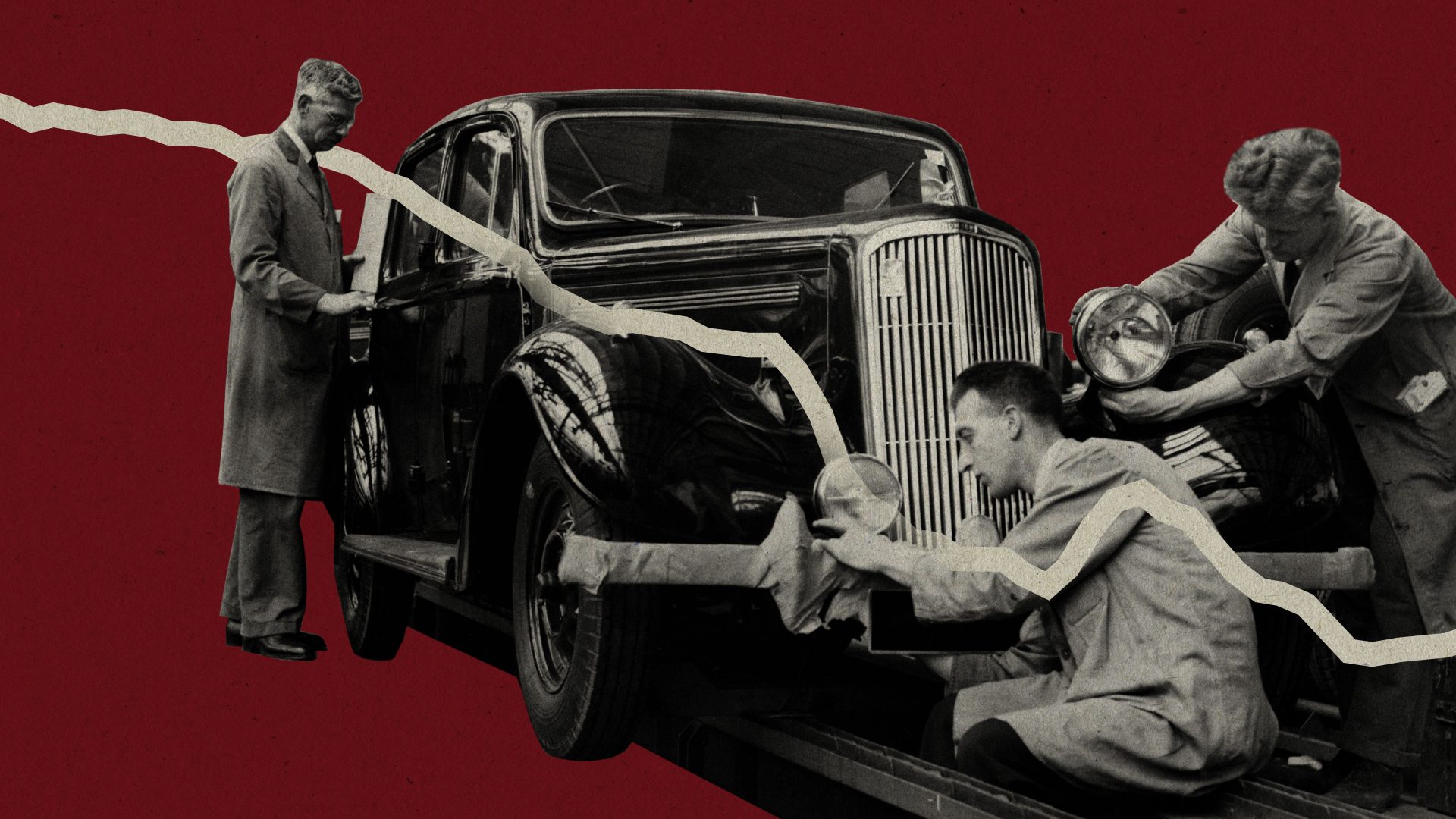During the run-up to the EU referendum, the hard Brexit lobbying group Economists for Brexit predicted that leaving the EU would create a boom for the British economy of 4%. There was only one tiny snag, Prof Patrick Minford of the group admitted – it would also “effectively eliminate” the entire British manufacturing industry.
Of course, the 4% boost has not happened, but thankfully neither have all our manufacturers yet shuttered their doors. But this is no thanks to Brexit. It was always going to hurt manufacturing; then the trade deal negotiated by Boris Johnson and David Frost heaped on extra costs. The way successive UK administrations have gone about implementing Brexit has made things even worse.
Why does this matter, if according to people like Minford we could still grow even if UK manufacturing was eliminated? It is because even though manufacturing only officially accounts for around 10% of the British economy, it is in fact far more important to the nation and our economy than those headline figures imply.
British manufacturers produce 45% of all the UK’s exports, and they pay for 65% of all the private research and development in the country. Manufacturing employs the services of many other industries, from catering to software design and logistics. It pays its workers well, which is reflected in the government’s tax take – wages in the manufacturing sector are 15% above the national average.
Take all that into account, and manufacturing is probably more like 20% of the British economy and absolutely vital to our trade balance, science base and prosperity.
But manufacturing is particularly vulnerable to Brexit. A large swathe of manufacturers in the UK are owned by foreign firms. We need those foreign owners to keep investing in their factories here, but one of the main reasons they were based in the UK in the first place was that it offered them seamless access to the single market – until we left the EU, that is.
Seamless access was important not just because a manufacturer’s finished products could be sold easily across the continent, but because its supply chains were continental, too. Components were shipped and flown around Europe: a car’s headlights could start as bulbs in Poland, be wired up in Slovakia, be integrated into a complete sub-assembly in France, then be fitted into the car’s front panel in Holland and finally be added to the almost completed car at the end of an assembly line in Oxford. This is why the industry has a saying, “it takes a continent to make a car”.
The problem now is that the UK has left that continental economy and placed barriers in the way of business. Remember, the cost of red tape at the border with the EU is £7bn a year. This isn’t a calculation by Remainers or Rejoiners, it is according to the government’s own figures.
So Brexit, even if it had been introduced sensibly, was always going to undermine the rationale for producing in the UK. And as we know, it was not introduced sensibly. In fact, new research from Make UK, the trade body for British industry, is very worrying.
Investment by continental firms at their plants in the UK, once assumed to be well above UK average levels, is now half the investment made at plants run by UK-owned firms. These figures are anecdotal evidence that EU firms are now running down UK factories, or using them to supply just UK rather than EU demand. In either case, the UK is being ripped out of the EU supply chain and replaced by continental suppliers.
Certainly, Make UK’s head of EU and international affairs, Fergus McReynolds, sees a worrying trend in foreign companies that used to supply the EU market by importing via the UK. “What companies have started to do is to split that supply chain, so they have a GB market and an EU market and they operate them separately,” he says. McReynolds has found that while existing contracts for UK firms supplying continental firms are holding up well, 50% of Make UK’s members face a “real challenge” winning new contracts.
Companies from outside Europe are also having to decide where to base themselves now Brexit has happened. It is extremely worrying that Germany now attracts more Japanese firms than the UK, traditionally their favourite destination, and that Japanese investment is rising in many EU countries but falling in the UK. In fact, despite a new trade deal with Japan that was slightly better than the one the EU has, the UK’s trade with Japan has fallen rather than risen. The Department for International Trade’s own figures show that total UK exports to Japan amounted to £11.2bn in the year to March 2022, a fall of 6% on the previous year.
The reason seems to be that many Japanese firms based their European HQs in and around London and so their European profits flowed through the UK and counted as British. Now those companies have moved to the Continent and the money, jobs and trade have moved, too.
Just look at the decline of the British car industry in the last six years – figures from the Society of Motor Manufacturers and Traders show it has collapsed. There are many reasons for that including Covid, global supply chain issues and a shortage of computer chips, but the UK has been hit worse than its rivals. That is because it is the only one to have forced Brexit on its car industry.
Thanks to Brexit, our existing car plants are being overlooked when manufacturers look at where to build new models. Elon Musk bypassed Brexit Britain to build his Gigafactory in Berlin, and the new electric models of Jaguar, Lotus and now BMW’s Mini are all going to be built abroad. With new petrol and diesel cars set to become illegal in the UK by 2030, the industry looks to be in terminal decline.
If the issue of foreign-owned firms running down their British plants was not worrying enough, there are also a whole set of Brexit problems for manufacturing that have been made worse either by the incompetence of the British government’s negotiating position or by its insistence on changing everything to do with the EU.
For Britain’s huge chemicals industry, the costly headache is that having spent billions joining the EU’s REACH system, which registered, tested, approved and regulated just about every chemical in use, it must now repeat the process. That’s because rather than asking to stay in the EU system, Britain decided to copy it almost word for word and create UK REACH.
Dr Roger Pullin, head of chemicals and health policy at the Chemical Industries Association, told me that: “It potentially could cost £1bn plus; the problem comes from having to buy access to the data (belonging to EU REACH) and potentially companies may have to repeat some of the tests as a result.”
That is £1bn that our Continental rivals will never have to spend, but it gets worse. The UK exports a huge number of chemicals to the EU, which insists on those products meeting their standards, not ours. This means, as Dr Pullin explains, that “companies are going to have to comply with two pieces of legislation, the UK Reach system and the EU Reach. So, if differences do appear between the two, companies will have to meet both requirements.”
This means that there is not just the huge cost for chemical manufacturers forced to register for the new UK-only regulator, but double the amount of red tape as well.
Much the same problem is happening before our eyes with the CE mark – the little two-letter logo that is on virtually everything you own, from your car to a pair of headphones or a toothbrush. It is an EU-wide guarantee that the product is safe to use and complies with all EU standards, it can therefore be sold anywhere in the European Economic Area.
Did the UK try to stay in this scheme, which industry spent billions complying with over decades? Hell no! It created the UKCA, a copycat system that British industry is having to spend billions more registering with, all for no point whatsoever, except that Brexiteers can claim that we are finally free of EU red tape. The fact that, just as with REACH, they have doubled red tape for any company that manufactures products for both the UK and the EU market seems to have passed them by. No wonder those EU companies in the UK are investing so little.
McReynolds told me that what British industry actually wants is “a longer timetable that recognises that where the regulations on both sides of the border remain the same, we should continue to recognise CE marks in the UK. Only if the UK decides to diverge from those standards should we look at the introduction of the UKCA system”.
The same sentiment applies to the attempts by the UK government to set ever more ridiculous deadlines for the complete abolition of all EU laws, rules and regulations in the UK. This has not been helped by Tory Party leadership candidates trying to outdo each other by promising to do it by the end of next year – or even, as Rishi Sunak promised, within 100 days of becoming PM.
It may be a Brexiteer fantasy, but what British industry wants is consistency and the reliability that common standards bring. As McReynolds puts it, “Simply removing the legislation removes the certainty that the legislation provides and what is important is that the legislation predominantly provides a level playing field for companies to operate in and the removal of that legislation causes a huge amount of uncertainty in the market.”
There may be some respite for the manufacturing industry, because the prime minister has signalled that despite his promises at the hustings, he is not ready for a bonfire of EU rules just yet. Jacob Rees-Mogg’s absurd retained EU law bill demanded that everything with a whiff of Brussels be expunged from the statute book by the end of next year, but this looks likely to be pushed back to the end of 2026 – by which time the Tories may no longer be in power. The change of heart is likely to have come because the civil service has made it perfectly clear to Sunak that it would absorb a huge percentage of their resources, for no gain.
Yet it all adds up to a grim picture. UK manufacturing still has many world-beating sectors – pharmaceuticals, aerospace and food remain top of the league.
But Brexit has done absolutely nothing to help them or any other sector of manufacturing and has done a huge amount of damage, with no sign whatsoever that this government even recognises the problem. Last weekend, Michael Gove, who has been recalled to the cabinet, was wheeled out on the Sunday morning shows to claim that “on balance, Brexit has been a significant success for the country”. As opinion polls show, a significant number of people – even 2016 Leave voters – know this is a bare-faced lie.
Meanwhile, Britain’s trade deficit in goods is getting ever wider. The current account deficit was 2% of GDP in 2021; so far this year the deficit has averaged 6.3%.
With a currency that is more and more reliant on the support of the international markets, the trade deficit is just another worrying sign that the UK is living beyond its means and is increasingly uncompetitive.
The UK desperately needs a booming manufacturing sector that attracts foreign investors and companies to set up business here. Instead, thanks to Brexit, the British manufacturing industry has to cope with a government that seems intent on throwing ever more spanners into the works.




